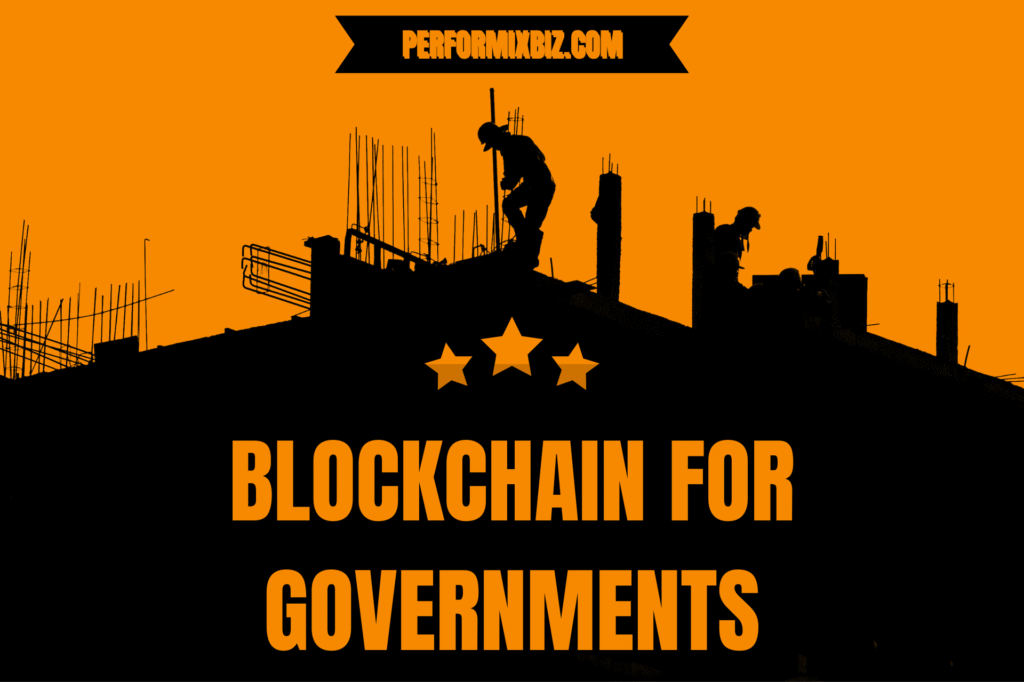Government adoption of blockchain technology
Governmental organizations like yours operate identical to their peers in the commercial sector and share their requirements for improved communication, efficiency, security, and data integrity. Therefore, it comes to reason that blockchain for business networks plays a crucial part in the digital transformation of government and its operations.
Why must you adopt blockchain and distributed ledger technology (DLT)? To combat government corruption, blockchain technology and distributed ledger technology (DLT) offer a unique combination of automated smart-contract capability, real-time transaction transparency, and tamper-evident record keeping.
The principles and structures created for blockchains and distributed ledgers are immensely adaptable and extensible to many disciplines, like management and development of the public sector, governance, taxation, voting, property registration, and many more.
Here, we will explore the top five programs that have been successfully enforced across nations and warmly embraced by their populace.
1. Computerized Identity Management
In 2014, 18% of unbanked people worldwide cited a lack of ID-related documentation as one of their reasons for not having a bank account.
DLT is the best solution to overcome this. It can be used to securely record and preserve citizens’ ID-related documents such as birth certificates and marriage certificates, as well as transaction histories, land titles, and health records.
DLT has the benefit of making it possible for individuals to own their data rather than the relevant government authorities. In some systems, users may pick which portions of their digital personal data they wish to make unrestricted to outside parties, which could be especially useful in Fragile Conflict and Violence (FCV) affected situations with inadequate institutional capability or volatile governing regimes. However, state institutions (or other official bodies) would still be required as identity data authentication bodies in most cases.
According to a global survey on “Know Your Customer” issues, the world spends approximately US $48 million on KYC every year.
Many public sectors have been potentially using blockchain to solve problems on data ownership and storing identity data. To ensure guaranteed data privacy requirements for ID applications that utilize DLT, permission-less blockchains, legal and regulatory frameworks have been incorporated into the systems.
In this digital age, the blockchain identification system has proven to be extremely beneficial to its users- it is now widely utilized in e-commerce checkouts, for immigration purposes, to apply for loans/insurance, and other legal procedures like proof of age/address submissions. This immutable and decentralized ledger enables intermediaries to validate the user’s data without wasting time or money.
2.Regulatory Compliance
Governments can streamline the administration of reliable data with blockchain technology and make it simpler for organizations to access vital data with ensured security.
Government blockchain adoption is increasing rapidly- changing the ways of enforcing the regulations. Here are some ways that blockchain is influencing international public policy.
KYC (Know Your Customer) and AML (Anti-Money Laundering) legislation -are used predominantly by the government to track client contacts with financial firms.
Blockchain’s transparency will make it possible for government regulatory organizations and financial institutions to interact directly on the same network. Thus, blockchain creates a much more efficient compliance environment canceling the need for a third party.
Research into the technology is already being done by the European Banking Authority and the US Federal Reserve Bank. The target is to attain greater compliance with the development of governmental blockchain-based registries.
Estonia’s government adopted blockchain in 2012 across its legislative, judicial, and security registries.
The bar for blockchain in governance has so far been set by many Eastern European nations. Currently, many other countries are working on initiatives that could have a massive global impact through blockchain.
3. Taxation Administration
Blockchain brings greater chances to simplify payments, allowing for transparent tax collection, efficient benefit distribution, and digital payments.
Here the taxpayer commits to real-time information, payment, and monitoring- all of which are assimilated into potentially transparent analytics and risk assessment framework that is rules-based. As a result, the administrative workload reduces, increasing the business certainty.
To enable effective benefit distribution and transparent tax collection; two factors must be met: first, smart contracts must be correctly leveraged; and second, a stablecoin (Bitcoin or ETH) must be utilized; otherwise, such implementation will fail and will most likely not provide the requisite added value in cost savings.
This depicts that the tax administration using DLT- gains from increased revenue through decreased fraud and noncompliance. Hence, blockchain can be viewed as a progressive step toward a digital future that relies on the horizontal monitoring approach to collective compliance.
4. e-Voting
Due to corruption, voting continues to receive more negative publicity. Gerrymandering, tampered ballots, and voters vanishing from voting registrations are frequent occurrences. Voters were compelled to leave their houses and bring paper votes to a local authority even when everything is done according to the rules.
This voting method was not only out of date, but it also had significant security flaws. Therefore, many governments started to switch over to blockchain.
Using DLT, a more dependable and practical digital voting system is possible. In e-voting, citizens cast their ballots using e-voting machines. These machines record data on the blockchain.
The distributed ledger’s integrity, pseudonymization, and verifiability are all made possible via encryption and decentralization. Since the network doesn’t exist in a single centralized location, no one party can destroy it or control it.
Even mail-in ballots cannot compare to a voting system built on the blockchain. Whereas using DLT, voter fraud in elections is avoided, thanks to the network’s high level of security. Blockchains have zero tolerances for a mistake and can give findings in minutes or even seconds, as opposed to traditional vote counts, which can take days.
Governments are already thinking about blockchain-based voting platforms as a way to boost trust and participation in crucial democratic processes -which results in growing concerns over election security, voter registration integrity, poll accessibility, and voter turnout.
The Liberal Alliance party in Denmark employs an electronic voting mechanism built on the blockchain.
e-Voting has already been adopted by many developed and developing countries and is still in process in under-developing nations. In addition to other benefits, e-Voting makes voting accessible to all residents and promotes the well-being of the community.
5. Development Aid Management
Blockchain technology has applications outside of the private sector. Governments all over the world are now working on more than 200 blockchain initiatives. The most recent advancements in blockchain-enabled government technology were discussed, along with how governments and their business partners are innovating to change how they do business and enhance the quality of life for their citizens.
Popular fields in which BlockChain/DLT was used for Development Management of Public Sector
In Education
Distributed ledger technologies, such as blockchain, present new chances for individuals to self-manage and provide evidence of their learning records, as well as for companies to find workers with the most desired competencies. This is especially important because of the need to formally recognize a wider range of innovation-related talents and also encourage international students and their working mobility. Within a nation, DLT is used for educational management to support and manage the working population, and plan for job opportunities to offer sustainable development.
In Transportation
The administration of passenger travel chains and supply chains may have just as much transformational potential for blockchain as the financial industry. The larger transport and mobility sector is home to hundreds of proof-of-concept projects, many of which have been running effectively for some time. These platforms include several that have drawn a sizeable portion of major international players in the logistics industry to collaborate with the government to ease freight services and also encourage tourism, exports, and imports which are the top economic resources of nations.
In Healthcare
Healthcare expenditures account for a sizeable portion of the GDP in many developed nations. Health data breaches are also anticipated to rise, costing healthcare development for the public.
DLT can transform healthcare by preventing data leaks that compromise the privacy of doctor-patient relationships. There are five areas in which blockchain aids in healthcare; these include the administration of data from personal health records, point-of-care genomics, electronic medical records (EMR), healthcare data protection and management, and electronic health records.
States can more efficiently handle medical supplies and people deployment to combat virus epidemics with DLT. On the flip side, this strategy also gives patients direct ownership of their data.
The recent pandemic is exemplary of DLT’s functionality and value through which the world was aware of details at every corner instantly, thereby contributing to prompt planning of reliefs and medical measurements.
Hence with proven records over administration and management of the public sector and people welfare, blockchain is always ready and pushing for more explorations. One of the most critical issues confronting governments worldwide is the scalability challenges, thus the ability of governments to upgrade their services in the upcoming years is anticipated to be significantly impacted by blockchain.
Although governments are still learning about and currently experimenting with this technology, many are beginning to see its promising edges. Therefore, we can conclude that there is a big chance that the governments and governance will become substantially more decentralized, given the enormous number of potential blockchain applications soon.






